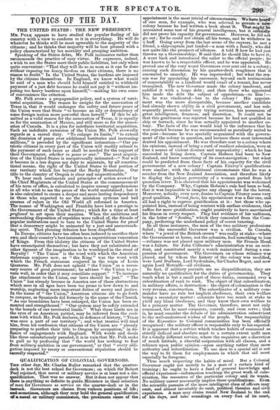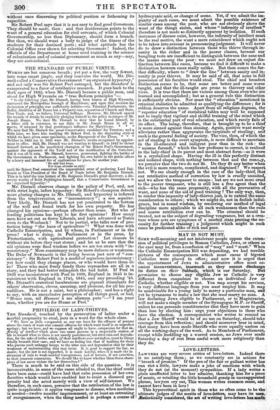QUALIFICATION OF COLONIAL GOVERNORS. THE other day, Mr. Charles Buller
remarked that the quarter- deck is not the best school for Governors; on which Sir Robert Peel rejoined, that naval or military service is at least not a dis- qualification.. That was no answer. But it does not appear that there is.anything so definite to guidelLinisters in their selection of men for Governors as service on the quarter-deck or in the Wreck. Governors are chosen from various positions of life; andiaometimea, although they may hold the general qualification anaaral or military commission, the pixozimate cause of the appointment is the most trivial of circumstances. We have heard of one man, for example, who was selected to • ern.. colony because he had written a book aboutlit. A., . accounted some test of his general intelligence, but it'
did did not prove his capacity for government. However, he did not go out ; for he could not obtain. all his terms, and he withdrew in
a huff. Going away from the last scene of the rupture, he met a
friend, a ship-captain just landed—a man with a family, who did not quite like the prospect of idleness. A told B how he had just thrown up a Governorship; B said that he should like to have it; A went back and introduced the sailor to the official people ; he was known to be a respectable officer, and he was appointed. He proved one of the very worst Governors ever sent out to a colony;
causing such dissension by his quarter-deck roughness that it amounted to anarchy. He was superseded ; but what the rea-
son was for appointing his successor, beyond such testimonials of respectability as a landlord would exact of a tenant, has never transpired. The new Governor made the colony insolvent, and saddled it with a large debt ; and then those who appointed him made the debt the subject of opprobrium—to him ?— No, he was vindicated—but to the colony! His appoint- ment was the more disreputable because another candidate had already shown ability in a civil government, and has sub- sequently proved, under very trying services, his possession of great intelligence, firmness, and discretion. It could not be that this gentleman was rejected because he had not qualified in ship or barrack, since he was actually appointed to another co- lony. The facts of the case would lead to the inference that he was rejected because he was recommended as peculiarly suited to the post—because he was specially acquainted with the govern- ment of the colony in question, and because those most interested desired his appointment. He was therefore sent to a colony where his opinions, instead of being a card of readiest admission, were at first a source of violent distrust and unpopularity; which he has succeeded in living down. Captain Hobson had been to New Zealand, and knew something of its coast-navigation : but what. could be predicted from those facts of his capacity for the civil
government of a new colony ? Captain Fitzroy's qualifications were similar ; with the additional circumstance that he was a
seceder from the New Zealand Association, and therefore likely to display the jealous perversity of a woman parted from her quondam lover. It is observed that his appointment was welcomed by the Company. Why, Captain Llobson's rule had been so bad, that it was impossible to imagine any change but for the better. Moreover nobody, even now, denies to Captain Fitzroy some very
good qualities, P riga facie,.his appointment was a fair one, and.
all had a right to express gratification at it: but those who ap- pointed him, instead of being content with surface evidences, that
suffice for mere gratification, ought positively to have ascertained his fitness in every respect. They had evidence of his unfitness, in the letter of "doubts," which they concealed from. the Com- pany, preferring the underhand policy of secret tutoring. In all these instances' the men of the two military professions failed ; the successful Governor was a civilian. In Canada,
where "a jewel of the British crown" was really at stake—where the Government at home, not the colonists, had, something to lose —reliance was not placed upon military men. Sir Francis Head,
was a failure. Sir John Colborne's administration, was an acci- dent, and constituted merely a watch maintained during a sus- pension of government. The Governors on whom reliance was placed, and by whom the history of the colony was modified, were Lord Durham, Lord Sydenham, Sir Charles Begot, and now again Lord Metcalfe—all civilians.
In fact, if military pursuits are no disqualification, they are assuredly no qualification for the duties of governorship. They teach what is but a small part of those duties, command over & subordination of rank to rank. The object of that subordination, in military affairs, is destruction : the object of colonization is the very reverse, construction. The subordinates of a military com- mander have no rule but implicit obedience, their own welfare being a secondary matter : colonists have too much at stake to yield any blind obedience, and they know their own welfare to be a primary matter, The Governor, therefore, must not only command, but he must cooperate, consult, and even serve ; that
is, he must consider the details of his administration subservient to the well-understood wishes of the people. The responsibility of the Executive to Colonial communities has been officially
recognized : the military officer is responsible only to his superior: It is apparent that a service which teaches habits of command so strictly defined and absolute must to a certain extent unfit men for a totally different service where the requisites are a discretion
of much latitude, a cheerful cooperation with all classes, and a reliance upon public opinion—upon anything rather than mere authority and subordination. To use men to a special aid is not the way to fit them for employments in which that aid must especially be foregone. Thus much respecting the habits of mind. But a Colonial. Governor ought not merely to be a man of a certain kind of training ; he ought to have a fund of general knowledge and official experience—information touching the great work of colo- nization, the resources of the particular colony and its wants. No military career necessarily implies these qualifications. Even. the scientific pursuits of the more intelligent class of officers may omit, and almost invariably do omit, political theories and civil experience. A man may cruise round. New Zealand to the end. of his days, and take soundings. on every foot of its coast,
without once discerning its political position or fathoming its capacities. Sir Robert Peel says that it is not easy to find good Governors. They should be made, then : and that desideratum points to the want of a general education for civil servants, of which Colonial Governorship, no less than Diplomacy, should form a branch. But then, we should want a body to judge of the fitness of the students for their destined posts ; and what aptitude has the Colonial Office ever shown for selecting Governors 'I Indeed, the officials of the Department at home need training in the science of colonization and of colonial government as much as any—nay, they are anti-colonial.



























 Previous page
Previous page